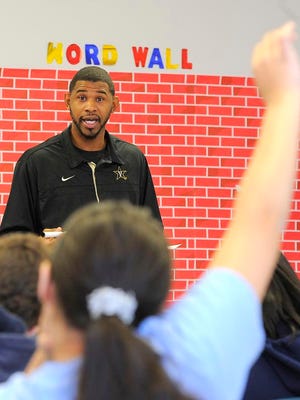- Jason Powers is the senior vice president of Administration and Ascend Federal Credit Union.
With the school year having recently started, this is an ideal time for parents to start helping their children learn the do’s-and-don’ts of managing money.
Financial education can dramatically and positively shape a young person’s financial future. It helps teach students the basics of money management – saving, investing, using credit cards and much more – so they can develop valuable habits that can last a lifetime.
Understanding and applying money management practices is critical for young people who may have to make significant financial decisions soon after graduating from high school or college. That includes taking out student loans if they’re going to college or creating a spending plan to manage their money after accepting their first full-time job.
Most high school students and young adults, unfortunately, say they don’t feel prepared. A March survey conducted by ENGINE Insights for Junior Achievement found that 87% of teens agreed with the statement, “Every student should have at least one financial literacy class before graduating high school.”

Unfortunately, only 38% of teens said they had some sort of financial literacy class in school. In my experience in the financial services industry, I have seen too many people come into our credit union seeking counseling to help get their financial house in order.
Most haven’t had the training that could have prevented many common mistakes— loading up on credit card debt or not having an emergency fund.
As a parent of school age children, my wife and I are making sure financial literacy and money management apart of the family discussion. Here’s how we’re doing it:
1. Determine a spending plan
For parents, the best place to start is to discuss the importance of creating a budget. Here’s an important tip: Call it a spending plan. Avoid using the word budget because it often has a negative connotation.
Young adults interpret a budget as something that restricts how they are spending their money. A spending plan, on the other hand, sounds like you are helping your children design a strategy that will help them spend their money more wisely, which is a lot much more fun.
When creating a spending plan with your child, discuss how you manage your own plan. Talk about categorizing spending into wants, like fashionable clothing or electronic gadgets, and needs, like food, gas and rent/mortgage.
Talk about real life trade-offs and compromises: not dining out frequently to save money for a family vacation or buying a used car instead of a new one.
Hear more Tennessee Voices: Get the weekly opinion newsletter for insightful and thought provoking columns.
Lastly, show your child how to take advantage of free financial education and financial literacy resources. Just about every credit union and bank offer free online platforms that can be used to create a spending plan.
For example, Ascend members have access to a wide variety of resources on our Money Management tool and kids can learn the basics by viewing short educational videos.
2. Save, save and save some more

After creating a spending plan, talk to your children about the importance of saving for the future—to pay for college or a down payment for a new home.
Emphasize this point: It’s never too early to start. Make sure your children understand that by saving now, that money has the potential to grow significantly over time. Break out a calculator and show how even small monthly deposits of money can increase over time, especially when put in a retirement account.
Bonus points to parents who take it up a notch and discuss what Albert Einstein called “the eighth wonder of the world” – compound interest.

In financial literacy programs with Ascend members, we are frequently reminding people that one of the best ways to build savings is to have money automatically deposited into various accounts.
If your child has a job, talk about how having funds automatically deposited from his or her paycheck into a savings account will reduce the temptation to spend money on things that are not included in their spending plan.
Hear from Tennessee’s Black voices: get the weekly newsletter for powerful and critical thinking columns.
3. Underscore the significance of an excellent credit score
Most parents know the importance of having an excellent credit score and how it can lead to a lower interest rate for a home or auto loan.
Just a half percent change in the interest rate can result in savings or extra costs of thousands of dollars for a car or tens of thousands of dollars in mortgage payments. A bad credit score can result in credit unions or banks turning down loan requests.
This area of financial education can be a little challenging to explain because a credit score consists of several different components: payment history (35% of the total score), credit utilization (30%), credit history (15%), credit mix (10%) and new credit (10%).
If you are the parent of a teenager, start the conversation now to see how financially literate your child is. Stress the importance of developing the right personal finance habits now so they can avoid costly makes and position themselves to build a solid financial future.
Jason Powers is the senior vice president of Administration and Ascend Federal Credit Union.





